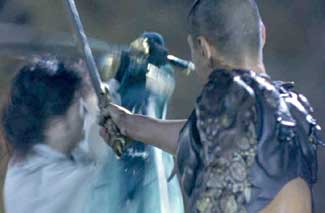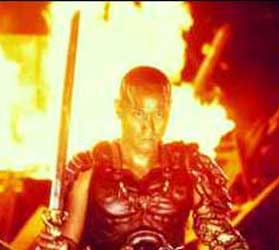It's pronounced "Goh Joh Eh" & it's the name of a bridge in Kyoto, famous in Japanese history & hero-myth.
Gojoe reisenki or Gojoe: Spirit War Chronicle is a true throwback to classic Japanese cinema & its brilliance is not difficult to gauge. The swordplay sequences are awesome -- one swordfight lasts fifteen minutes.
 The mythic element, however, may be disorienting to some western viewers, as the script in no way panders to the west. It draws on material well-known to its Japanese audience & to western nipponophiles. It is rendered more confusing if one accidentally rents the first 97 minute version distributed in the west, which is lacking important expositional passages of the full 137 minute version. The mythic element, however, may be disorienting to some western viewers, as the script in no way panders to the west. It draws on material well-known to its Japanese audience & to western nipponophiles. It is rendered more confusing if one accidentally rents the first 97 minute version distributed in the west, which is lacking important expositional passages of the full 137 minute version.
The Buddhist monk Benkei (Daisuke Ryu) has taken a vow of pacifism, until he is informed that a demon of Gojoe Bridge has taken many lives. Aided by Tetsukichi (Masatoshi Nagase) who steals swords from slain samurai & has built up quite a collection thereof, Benkei uncovers the truth that the seemingly invisible warrior-demon is Prince Yoshitsune, in his youth known as Shanao (Tadanobu Asano) who walks a road of cruelest revenge against the Heikei Clan.
The film goes from great to super-great if one knows how the story of Benkei & Yoshitsune usually runs. This film really tweeks the standard tale, which in the traditional version has the warrior-monk Benkei acting on a vow to take one-thousand swords away from one-thousand samurai. He takes his position on the bridge & with demonic ferver begins the long process of duelling every day. When he is on the verge of achieving his goal, who should arrive but the effeminate though ultra-skilled Yoshitsune. Benkei's defeat induces him to swear lifelong allegieance to Yoshitsune.
Director Sogo Ishii refashions these two figures into demonic star-divinities whose paths cross upon the Earth so that they are drawn together in what amounts to supernatural combat to-the-death. Yet it treds the line of realism so that the mutual charisma that draws them together may not be supernatural at all, but a dramatic consequence of their highly developed ki energy.
In Japan many criticized the film for its revisionism of a legend that in its original virtually defines Japanese character. The idea of Benkei & Yoshitsune as destined foes is for some as disturbing as any religious heresy. Others praised this very daring. In the west, given the unfamiliarity with the myth Ishii has revised, its brilliance for more than violent display has often gone unnoticed or misunderstood.
The film's coda will be recognized by kabuki fans or who at least saw Kurosawa's They Who Tread on the Tiger's Tail (1945), drawing a neat comparison between the demonic figures of the present film, & the "other" Benkei & Yoshitsune of the traditional tale.
Even without understanding its full level of intent, Gojoe is a solid, intense samurai film. It could well take two viewings to fully decipher, yet a few western critics have immediately recognized in Gojoe a level of severity & aesthetic ideal associated with such classic films as Kurosawa's Seven Samurai & Rashomon.
copyright © by Paghat the Ratgirl
|

 The mythic element, however, may be disorienting to some western viewers, as the script in no way panders to the west. It draws on material well-known to its Japanese audience & to western nipponophiles. It is rendered more confusing if one accidentally rents the first 97 minute version distributed in the west, which is lacking important expositional passages of the full 137 minute version.
The mythic element, however, may be disorienting to some western viewers, as the script in no way panders to the west. It draws on material well-known to its Japanese audience & to western nipponophiles. It is rendered more confusing if one accidentally rents the first 97 minute version distributed in the west, which is lacking important expositional passages of the full 137 minute version.